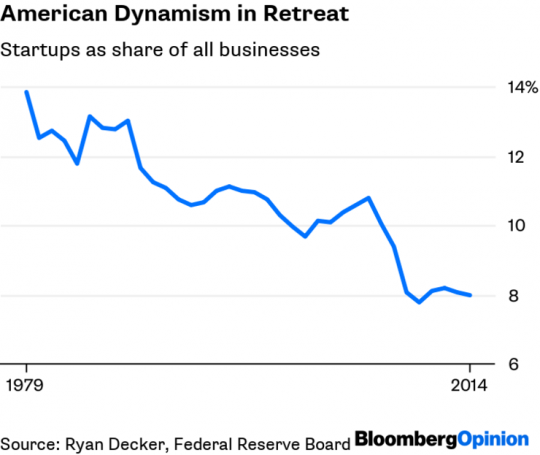|
|
|
|


Startups and small businesses have been an inextricable part of the notion and idea of the American Dream. Over at Bloomberg, Noah Smith cites data from a recent economics paper that spells trouble for an economy looking to foster middle class growth (at least with this approach). But equally as worrisome, if Smith is correct, is the effect he says this will have on future economic progress.
Tech businesses, unlike corner stores, tend to be high-growth businesses that employ lots of people. That same demand for labor also probably helps to drive up wages. And perhaps most important for the long term, technology startups are important for productivity growth.
Innovation is at the core of what tech startups do. They don’t necessarily do original science, but they take scientific findings and new technologies and combine them with creative new business models. That results in either better or cheaper versions of existing goods — for example, improved lithium-ion batteries — or entirely new goods that people didn’t even realize they would want, like coding tool GitHub (which was recently acquired by Microsoft Corp. for $7.5 billion). Newer, better and cheaper products raise the overall standard of living in the economy.
Smith puts forward that tech giants like Google and Amazon may be gobbling up or locking out tech business, just as firms like Walmart and Target did in retail.
These companies may be such powerhouses that entrepreneurs don’t find it worth their while to enter the market, because they’ll just get out-competed.
If Alphabet et al. are actually doing their own innovation, like Bell Labs or Xerox PARC in past decades, then this isn’t that big of a problem. But if it’s merely the threat of big-company competition keeping tech entrepreneurs out of the market, the picture looks worse.
There are benefits with scale, but there are also benefits from competition and a fertile ground for innovation. Finding the right balance is key.
Read the whole take here.
|
|
|
| |